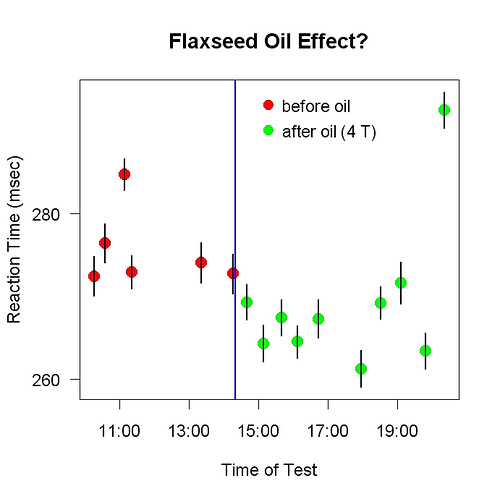A friend who has known me for years said I became more talkative recently — around the time I started taking flaxseed oil. In the letter-counting task I have been using, there is an increase in error rate at the same time that flaxseed oil is reducing reaction time — I become more “jumpy”. It is as if flaxseed oil lowers a threshold for action.
Maybe I could measure this. Following some of Greg’s principles, I devised what experimental psychologists call a simple reaction time task: I see colored circles on my laptop screen and press a key on the keyboard as quickly as possible when a circle appears. The computer beeps 0-4 times depending on how fast I respond.
With the letter-counting task, I kept improving for at least 100 sessions. With this task, I stopped improving (getting faster) after about 2 sessions. I took 4 T flaxseed oil around 2 pm and measured my reaction time before and after. Here are the results.

My reaction time decreased with roughly the time course I’d seen in other tests. The percentage decrease was unsurprisingly small but it was quite clear. It was hard to tell how long it lasted.
I was impressed how easy the whole thing was. It only took about an hour to write the experiment-running program (because I could modify something I already had) and the necessary pretraining (learning the task) was trivial (a few minutes, in contrast to weeks with the letter-counting task). I’m unsure how much follow-up of this I will do but it was reassuring to find similar results (flaxseed oil improves performance) in another task.
Dr. Roberts,
Are you really taking 4T of Flax seed oil? It seems a lot. I take about 1 T-2T (12 -24 oil capsules) a day. I wonder what the most optimal dose would be?
For what it’s worth: I always take about 2-2 and a half tablespoons of flax seed oil in the morning, around 8-8:30. The one very striking thing I’ve noticed has to do with notetaking work. I take notes for 2 classes on Monday and Wednesday. I take notes from 10-11, come home and write up the notes from about 11:45-1:05 and return to take notes from 2-3; then come home again to write those up and finish the first batch, if I haven’t already. What is striking is that I seem faster, more efficient, in taking and writing up the notes at 11:45 than I have ever been. There is a rapid flow from the notes onto the page as I write them that is faster than I have ever experienced — and I have been doing this for 15 years.
I suppose I could try not doing the flax seed oil in the morning and see if I am still so fast, but I really don’t want to… In the afternoon, I always experience a drop in energy, but I may do some flax seed oil then to see if that affects my mental functioning.
Subjectively, it seems to be an issue of mental energy. I hope somebody does standard double blind studies of this soon — the broader community won’t buy it until we have that…
Johanna, yes, I am. I found that 3 T worked better than 2 T. I haven’t yet compared 3 T and 4 T.
“It is as if flaxseed oil lowers a threshold for action.”
I noticed this phenomenon. I think its a good thing. Flaxseed oil appears to decrease my overall laziness.
Is there any negative aspect of using Flaxseed oil instead of Canola oil for the SLD (using the plug your nose method)? I don’t think so. Maybe cost.
I don’t think so either.
1. do a one-tailed test. you did a two-tailed test. I predicted the direction of the effect.
2. omit the first and last “after” values (269 & 295). I believed that the effect would take about an hour or more to develop and would wear off after 4 hours or so.
then you get t = 3.8, highly significant
“Creepy feelings about one-tailed tests” — in this particular case, why?
Hmm. Thanks for the explanation. When lots of previous results lead one to expect an effect in a certain direction, I’m afraid I still don’t see the problem with using a one-tailed test. But it hardly matters, since the effect was so strong. That’s the nice thing about self-experimentation; you can usually do the experiment again.